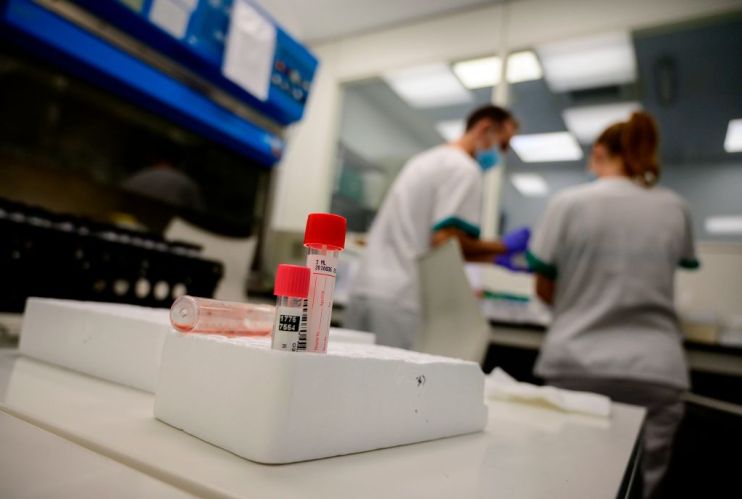Only global medical cooperation can defeat Covid-19

More daily confusion. Schools shut, but pubs open? Pubs shut, but schools partly open? Schools closing again? Boost tourism, but visitors from abroad in quarantine? Brits coming home quarantined in Scotland and Wales, but free to walk around in England?
Unending, unedifying; one thing is clear. If life is to return to anything like it was, medicines to treat Covid-19 and a reliable vaccine to control it must be found, tested properly, and people convinced they are safe.
In record time there have been multiple drug trials — almost all failing — and nearly 165 candidate vaccines are being tracked by the World Health Organisation. That is just since January.
Big pharmaceutical companies and world class universities are in a grim, competitive race. The US government has already tried to buy the entire global output of the medicine it believes is most promising. They have forgotten the meaning of “pandemic”: if the disease is anywhere out there, the risk remains everywhere.
In the prescient words of Sir Jeremy Farrar, the Wellcome Trust chief executive: “The virus cannot be defeated by insular nationalism, blaming others or diffusing into a more polarised world — all this only leaves everyone more vulnerable.”
So, the spirit and necessity for meaningful cooperation has drawn me to intensive work with the Cuban biopharmaceutical expert scientists.
Havana does not change much on the surface. Loved by tourists, full of music and amazing 1950s American cars. But if you lift the bonnets, you will find remarkable, inventive engineering keeps these huge motorcar monsters going. Inventive, world-class science is mission critical to a nation cut off in so many ways by its very powerful neighbour.
But make no mistake, below the bonnet Cuba is a global powerhouse in biomedicine and vaccine research. A 2015 World Health Organisation report said that Cuba is a “global leader in the south-south transfer of technology”, helping low income countries develop their own domestic biotech capabilities, providing technical training, and facilitating access to low-cost lifesaving drugs to combat diseases such as meningitis B and hepatitis B.
And, now alongside global giants such as Oxford University, AstraZeneca, China’s CanSino and Sinovac, and the USA’s Moderna, Cuba is leading the battle with Covid-19.
Cuba has grouped all its biotech and pharmaceutical companies into BioCubaFarma (‘BCF’) to coordinate the manufacturing of medicines, diagnostics and medical equipment. The mandate is to cooperate and to detect the interplay of factors in complex diseases.
So far, 22 medicines for the treatment of Covid-19 have already successfully emerged. They include Interferon Alpha 2B, an antiviral which has been combined with other drugs to boost the antibodies that Covid-19 depletes. It is especially successful in already immune-compromised patients. For months it led the global field in Interferon medicines.
Cuba now has what many describe as a game-changing wonder-drug, JUSVINZA, developed inside BCF. Administered to patients considered to have little clinical chance of survival, often on intrusive ventilator pumps, it has returned over 90 per cent of them to health and to home. Still in its full trials which we hope to extend to the UK, Europe and the Commonwealth, it has really strong credentials.
BCF is now at work on a vaccine. If it matches the success of other breakthrough medicines, it could emerge as a building block among those provided by other international scientists, in restoring normal life. Hence my strong desire for cooperation.
Cuban medicines may, of course, not be the panacea we all hope for. There are still mountains to climb among cooperating scientists. That is true everywhere, but the quality of results so far is inspiring. A key element of the inspiration is the spirit of cooperation that Sir Jeremy Farrar called for. For Cuba, it means stepping out of the historical shadow cast over them. It is a paradox that this view of international joint effort gripped Ronald Reagan, whatever else he thought of Cuba. Sadly, this view of global development has been lost in ideology.
The medical and barrier-breaking opportunities are very attractive for both the UK and Cuba. We have created a new joint venture called BioFarma Innovations (BFI) with BCF. Our aim is to bring key medicines and leading scientists and clinicians to the UK, to develop testing regimes and clinical trials, and to do it together.
It is an amazing opportunity to harness the output of a leading medical research nation, however restricted its economy is in other respects. It is rare — perhaps unique — to work with combined talent and to create even larger global resonance by cooperating more widely in the scientific world. To beat disease, this offers by far and away the greatest prospect. And among scientists and clinicians it absolutely goes with the grain.
Main image credit: Getty